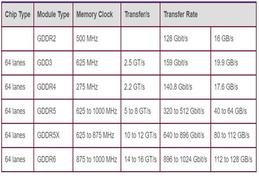GDDR Memory: Advantages and Disadvantages
Advertisement
This page explores the pros and cons of GDDR (Graphics Double Data Rate) memory, along with a basic overview. It highlights the benefits and drawbacks of GDDR memory.
What is GDDR Memory?
Introduction: GDDR stands for Graphics Double Data Rate memory. It’s a type of SDRAM (Synchronous Dynamic RAM) specifically designed for video cards. Various versions exist, including GDDR1 to GDDR5, GDDR5X, and GDDR6. It offers more advantages compared to DDR memory, which uses two data transfers per cycle.

GDDR5 is a widely used, high-performance memory found in many existing graphics cards. It’s used in various budget-friendly graphics cards like the GTX 1060/1070, Radeon RX 480, GT 730/740, and RX 460. GDDR memories are manufactured by companies like Samsung, Hynix, ELPIDA, and Micron. GDDR5 chips come in sizes like 512 MB, 1 GB, 2 GB, 4 GB, and 8 GB. Furthermore, GDDR5 supports a 32-bit wide bus width. The figure shows the structure of a GDDR5 memory type. It has a square or rectangular appearance.
The following table compares different GDDR memory types in terms of memory clock and transfer rate.
| Chip Type | Module Type | Memory Clock | Transfer/s | Transfer Rate |
|---|---|---|---|---|
| GDDR2 | 500 MHz | 128 Gbit/s | 16 GB/s | |
| GDDR3 | 625 MHz | 2.5 GT/s | 159 Gbit/s 19.9 GB/s | |
| GDDR4 | 275 MHz | 2.2 GT/s | 140.8 Gbit/s 17.6 GB/s | |
| GDDR5 | 625 to 1000 MHz | 5 to 8 GT/s | 320 to 512 Gbit/s 40 to 64 GB/s | |
| GDDR5X | 625 to 875 MHz | 10 to 12 GT/s | 640 to 896 Gbit/s 80 to 112 GB/s | |
| GDDR6 | 875 to 1000 MHz | 14 to 16 GT/s | 896 to 1024 Gbit/s 112 to 128 GB/s |
Source : https://en.wikipedia.org/
Benefits or Advantages of GDDR Memory
Here are the benefits or advantages of using GDDR memory:
- Higher Bandwidth: GDDR offers significantly higher bandwidth due to a wider memory bus.
- Lower Power and Heat: It generally has lower power consumption and heat dispersal requirements compared to DDR memory.
- High Performance, Simple Cooling: It enables high-performance modules with simpler cooling systems than DDR memory.
- Higher Capacity: GDDR offers higher maximum capacity compared to DDR memory.
- Faster Operations: It provides higher speed and faster operations than DDR memory.
- Widespread Use: It’s widely used on various graphics cards from numerous manufacturers.
Drawbacks or Disadvantages of GDDR Memory
Here are the drawbacks or disadvantages of using GDDR memory:
- Higher Cost: GDDR is typically more expensive than DDR memory types.
- Heat Dissipation (Specific Versions): Certain GDDR versions, like GDDR5X, can dissipate more heat and may require thermal pads.
- Larger PCB Footprint: It requires more space on the PCB (Printed Circuit Board), leading to larger card sizes.
- Lower Density: Its density is lower, often necessitating multiple modules around the GPU.
 RF
RF

